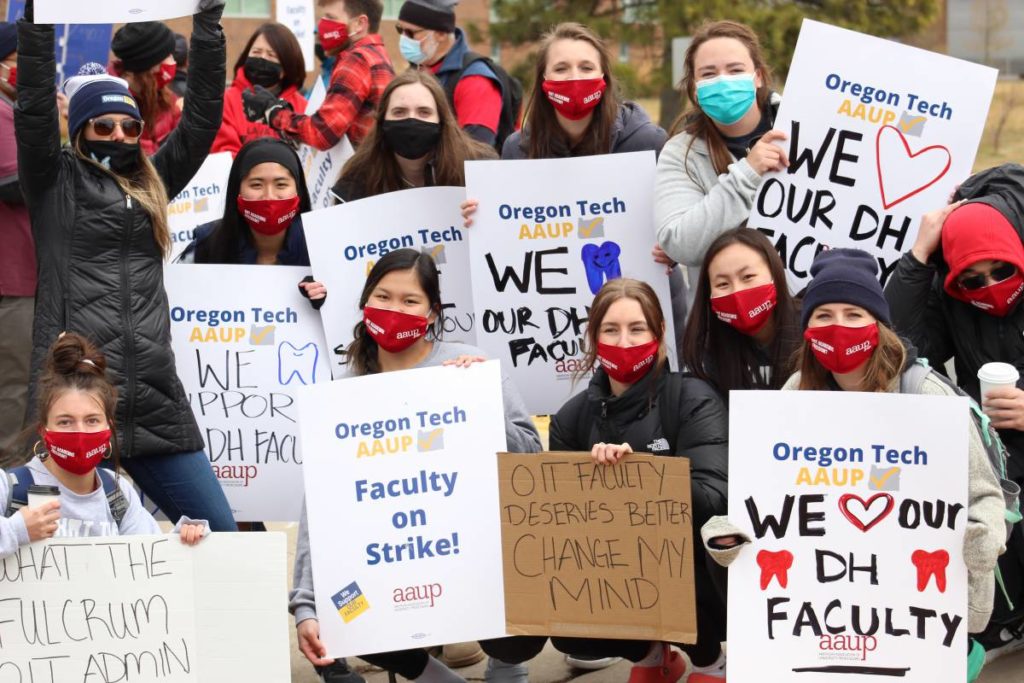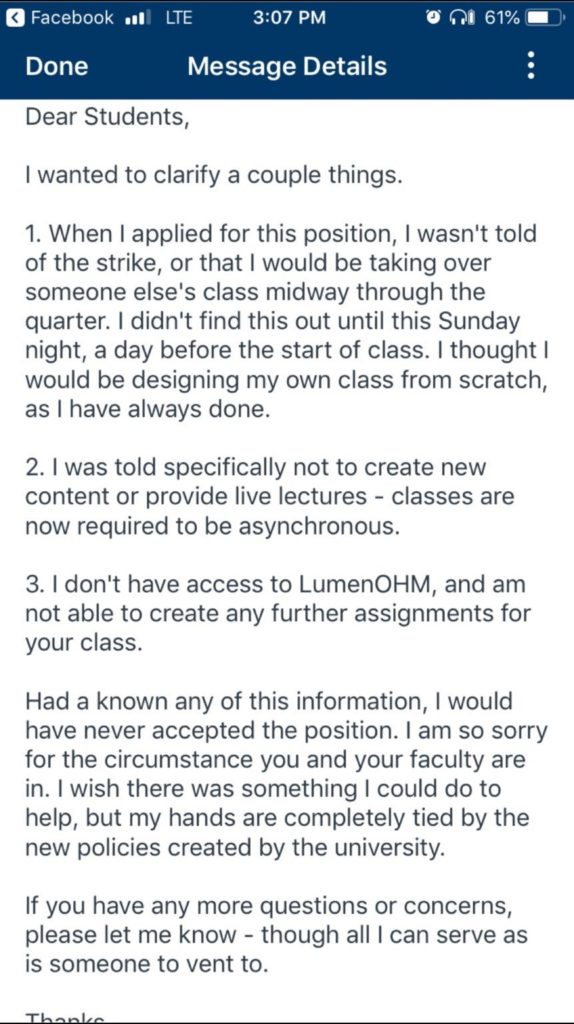April 26 marks the start of the first public university strike in Oregon’s history. After 550 days of negotiations, the faculty, represented by American Association of University Professors, were forced to withhold their labor from an administration which refused to bargain in good faith. The faculty have demanded a modest raise, secure benefits, and a reasonable and clearly defined workload.
Faculty at Oregon Institute of Technology have been trying to negotiate for these benefits for over 3 years. After exhausting all other options through existing channels, they unionized through AAUP in 2018.

It is important to OIT students that their faculty are treated fairly. “When the faculty suffers, students suffer,” Alexander Zendejas, OIT student, put it. Many students have joined their professors on the picketline, and a significant number have walked out of scab classes.
Administrators’ lies
The administration has brought in scab replacement instructors. “Oregon Tech has been planning in the event that a strike occurs and we intend to remain open and continue classes,” Dean of Students Erin Foley stated in an email to the entire student body. “Be assured the replacement instructor credentials have been reviewed and the instructor will be qualified to teach the course subject matter.”

Since the strike started, students and faculty have received emails from the scab replacement instructors indicating that the scab hires had not been told they were covering for striking faculty.
Administrators have been abusing email lists to send out biased anti-union messages. Ken Fischer, OIT’s acting chief fundraiser, claimed it was “disappointing” that “some” faculty have “chosen” to walk away from their classes, despite a “generous” offer from Oregon Tech. “Some” is an understatement. Ninety-six percent of faculty voted in favor of the strike. Fischer used the Oregon Tech Foundation’s mailing list to send this message. Anyone who has ever donated to “give a hoot day” received this in their inbox.
OIT President Dr. Nagi Naganathan, and Dr. Erin Foley, Dean of Students, have also been using their access to students’ emails to send their opinions about the labor dispute to the entire student body. These emails contain vague platitudes about supporting the students. A variant of Naganathan’s “You, our student, are our primary concern and are the highest priority at Oregon Tech,” has appeared in every email about the situation.
Issues behind the strike
“They wanted the ability to change our [medical] provider, and there was a proposal on the table to increase our costs,” explained Franny Howes, an OIT faculty member. “Our benefits are good. We would like them to be secure and clearly defined in our contract.”
Howes has had to take on a multitude of responsibilities during the pandemic. Howes’s normal teaching load is four classes per term. But Howes has also had to step into multiple additional committee, student support and administrative roles as well as teaching five classes this quarter.
Oregon Tech faculty are paid less than 87.5% of the market salary rate, and their cost of living has been increasing by 2% each year, but their salaries have not kept up. As such, the faculty have demanded a $2.5 million wage increase for 2021. The administration has instead insisted that such demands can only be met by raising tuition — they have raised tuition from $9,541 to $11,269 between 2018 and 2021 and the faculty saw no increase in their salaries. They have instead been offered “merit-based” raises. Rather than offer a fair and equitable increase in wages and secure benefits, “merit-based” wages would force faculty to compete for a limited pool of money.
Administration costs have increased by $2 million, or 19%, between 2018 and 2020. The salary of Naganathan has increased by 67% from 2017 to 2020. It now sits at $350,000 per year. Administrators say they deserve this pay increase they have given themselves because of the extra responsibilities they have had to take on in the pandemic, but many faculty have taken on immensely increased workloads with no additional compensation. Howes’s only additional pay was for teaching overload. “Nobody’s ever offered me a second salary for taking on additional work.”






